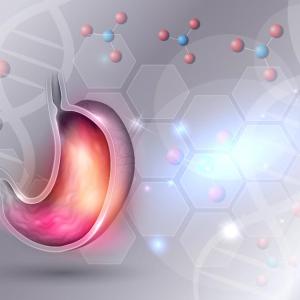The use of menopausal hormone therapy among postmenopausal Asian women has been linked to a reduced risk of gastric cancer in a study.
Analysis of data from the Korean National Health Insurance Service showed that women who were exposed to menopausal hormone therapy had a 12-percent lower risk of incident gastric cancer compared with those who were never exposed (hazard ratio [HR], 0.88, 95 percent confidence interval [CI], 0.83–0.93). [Maturitas 2024;doi:10.1016/j.maturitas.2024.107960]
The protective effect on gastric cancer risk was strongest among those who had received menopausal hormone therapy for 2–5 years (2–5 years: HR, 0.84, 95 percent CI, 0.75–0.93; <2 years: HR, 0.91, 95 percent CI, 0.81–1.02; ≥5 years: HR, 0.86, 95 percent CI, 0.83–0.95) and pronounced when therapy was initiated before the age of 50 years (HR, 0.55, 95 percent CI, 0.36–0.84) than at age 50 years and beyond (HR, 0.89, 95 percent CI, 0.84–0.94). This, according to the investigators, may reflect the fact that diffuse type gastric cancer occurs more frequently in women under 50 years of age and that reproductive factors may offer protection against intestinal-type gastric cancer. [Gut Liver 2017;11:807-812; Gut Liver 2022;16:706-715]
“Our findings, which suggest a negative association between menopausal hormone therapy and the risk of gastric cancer, are consistent with the results of a previous meta-analysis involving 11 studies. The pooled results … demonstrated that women using oestrogen-progestin combination therapy were at a 30 percent lower risk of gastric cancer,” the investigators noted. [Sci Rep 2022;12:12997]
“The observed decrease in the rate of gastric cancer risk in our study was relatively low compared to the findings in the meta-analysis,” a difference that may be explained by the present study relying on self-reported questionnaire data regarding the history of menopausal hormone therapy use rather than pharmaceutical data, they added.
As for the biological mechanism underlying the effect, an imbalance in oestrogen receptors that favours ERα over ERβ in malignant gastric tissues relative to normal gastric tissues may be involved. The investigators cited several in vitro studies wherein ERα36–mediated rapid signalling stimulated cancer cell growth and wherein external hormones binding to ERβ could decrease cancer cell survival and trigger cell death. [World J Gastroenterol 2016;22:2475-2482; Medicine 2019;98e17954; Oncol Lett 2018;15:10031-10036; Mol Cell Biochem 2014;395:99-107]
The study included 214,723 women (15.9 percent) with a history of menopausal hormone therapy exposure and 1,139,898 women (84.1 percent) without such exposure in Korea. The exposed group was more likely to be younger (mean age 58.88 vs 62.25 years; p<0.0001), have a lower body mass index (mean 23.86 vs 24.28 kg/m2; p<0.0001), and less likely to have medical conditions such as diabetes (9.91 percent vs 13.99 percent; p<0.0001), hypertension (39.67 percent vs 48.20 percent; p<0.0001), and dyslipidaemia (33.71 percent vs 34.77 percent; p<0.0001).
Over a mean follow-up of 8.32 years, a total of 12,496 gastric cancer cases were documented, including 1,534 in the exposed group and 10,962 in the nonexposed group.
“While our data may have some limitations … this study is the largest cohort to identify an inverse association between menopausal hormone therapy and gastric cancer risk in postmenopausal women. This finding persisted after adjusting for several gastric cancer risk factors, such as tobacco smoking, alcohol consumption, obesity, and diabetes, within one of the world’s most prevalent countries with gastric cancer,” the investigators said.
Then again, they acknowledged that the evidence is insufficient to definitively endorse the use of menopausal hormone therapy for cancer prevention alone.
More studies are needed to shed light on the involvement of oestrogen in gastric cancer development to establish the potential role of menopausal hormone therapy in preventing gastric cancer within a specific situation, according to the investigators.

